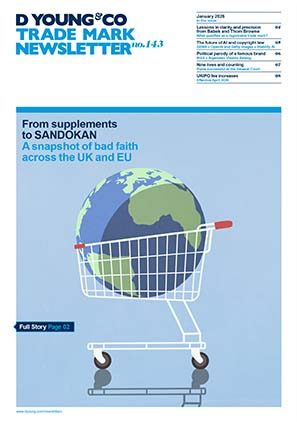Luxury goods at discount stores: who doesn't love a bargain?
This case focuses on when damage to a reputation can constitute a legitimate reason to prevent the sale of exhausted goods.
Coty is a licensee of trade marks for JOOP! and CALVIN KLEIN in the EU. Prior to Valentine’s Day 2018 ALDI SÜD advertised JOOP! and CALVIN KLEIN perfumes in its brochure. However, the products had been sold in its stores at least since December 2017 up until October 2018. The perfumes were 1) original (unaltered) products and 2) placed on the EU market with Coty’s consent.
Coty claimed trade mark infringement. The advertisement and sale would tarnish the marks’ reputation. This would constitute a legitimate reason to prevent sales; though the trade mark rights were exhausted.
Outcome of the decisions
At first instance, the Regional Court of Düsseldorf denied any infringement claims. Coty appealed.
The Higher Regional Court of Düsseldorf overturned the decision in part and found the in-store sale to be infringing. However, it upheld the first-instance decision with regard to the advertising of the perfumes in ALDI’s brochure.
Previous case law
The Higher Regional Court of Düsseldorf relied on the Court of Justice of the European Union (CJEU) decision in Parfums Christian Dior v Evora (C-337/95) in which the CJEU had confirmed that damage to reputation can constitute a legitimate reason to prevent the further sale and advertising of exhausted goods.
The Higher Regional Court of Düsseldorf also referred to the CJEU decision in Christian Dior couture v Copad (C-59/08). This decision confirmed that a licensor can potentially stop the sale of its luxury goods to discount stores if the licensee is doing so in breach of the license agreement and there is damage to its reputation.
Relevant factors
Overall, whether the trade mark owner can prevent resale is a balancing act.
The Higher Regional Court of Düsseldorf considered the following factors:
- the nature and level of prestige of the luxury goods in question;
- the volumes sold and usual trade channels, in particular if usually sold in discount stores;
- the nature of goods usually marketed in discount store; and
- the marketing methods usually used by discount stores.
Application to case at hand
The Higher Regional Court of Düsseldorf found that both JOOP! and CALVIN KLEIN enjoy a certain luxury aura due to their selective distribution system, which was undisputed at least in relation to Germany. Further, it was irrelevant that the perfumes could also be found in drug stores, and Coty was not objecting to these sales. In this context, the court noted that perfumes would be sold in separated sections in drug stores and, thus, differ from the sales by ALDI.
Aside from that, the fact that the perfumes are only medium-priced premium goods would not prevent their luxury aura.
Concerning the sale, in the stores, the court found that the presentation of the perfumes would lack any exclusivity, which would not do justice to the repute of the marks.
While the perfumes may have been in glass cabinets, these were mixed in with the normal assortment and not highlighted in any way. In addition, the court noted that ALDI customers understood the glass cabinets to be a means to theft prevention and did not stand out from the rest of the interior. A further factor was the sale of the goods not just for Valentine’s Day, but a prolonged period.
As regards the advertisement, the court observed that the brochure highlighted the perfumes as special Valentine’s Day gifts. This was separated from other goods. The page only included references to other cosmetic products, such as mirrors and hair trimmer sets. Therefore, it did not consider this to tarnish the trade marks’ reputation.
In short
Whether or not one can prevent the sale of exhausted goods depends on the facts of the individual case. That said, the Higher Regional Court of Düsseldorf confirmed that damage to reputation can constitute a legitimate reason to prevent resale of exhausted (luxury) goods and provides a useful list to take into account. It seems the more “love” and outstanding position a discount store provides to its luxury items, the more likely it will be allowed to sell them.
Case details at a glance
Jurisdiction: Germany
Decision level: Higher Regional Court of Düsseldorf
Parties: Coty v ALDI SÜD
Citation: 20 U 278/20
Date: 29 June 2023
Useful links
- Case C-337/95, CJEU, 04 November 1997: dycip.com/c-337-95
- Case C-59/08, CJEU, 23 April 2009: dycip.com/c-59-08

